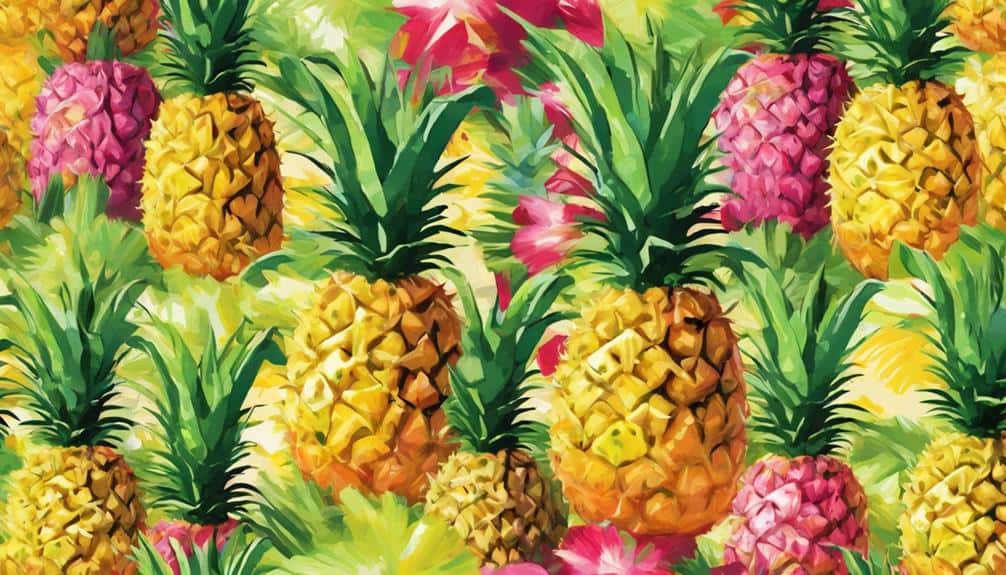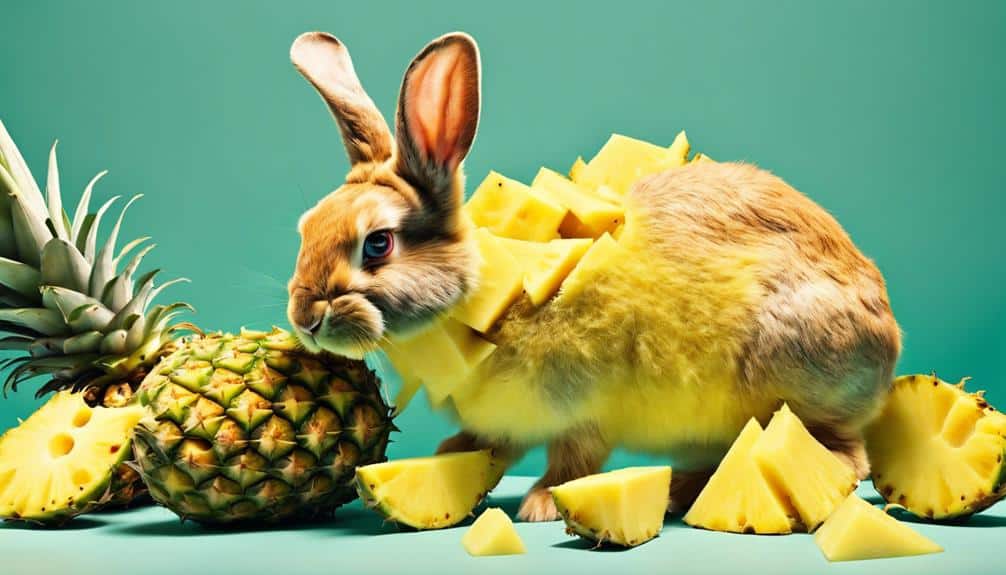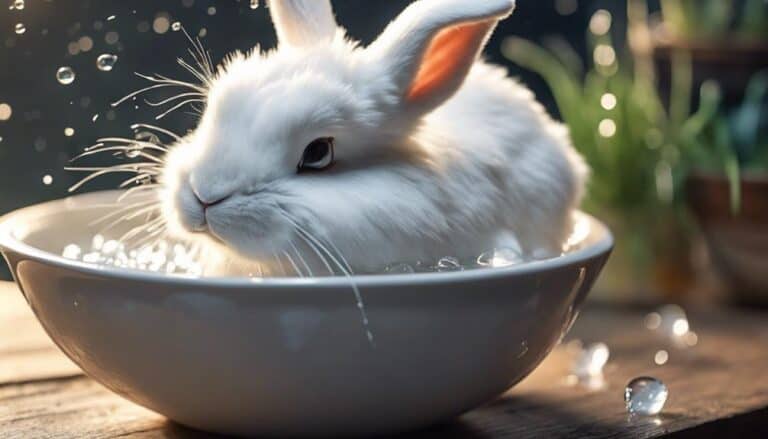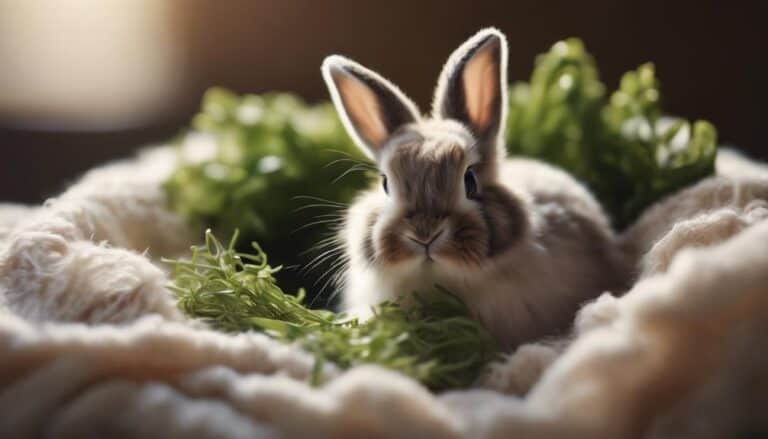Imagine introducing a bunny to a tropical island for the first time. The bunny's curiosity is piqued by the sweet aroma of pineapples hanging from the trees, but should you let it indulge in this exotic fruit?
While the allure of pineapple for bunnies is understandable, there are key considerations to keep in mind before offering this treat.
Stay tuned to discover the dos and don'ts of incorporating pineapple into your bunny's diet for a harmonious and healthy balance.
Contents
- 1 Key Takeaways
- 2 Pineapple Nutrition for Bunnies
- 3 Fresh Vs. Canned Pineapple Debate
- 4 Safe Pineapple Portions for Bunnies
- 5 Introducing Pineapple to Your Bunny
- 6 Pineapple and Rabbit Health
- 7 Alternative Fruits for Bunnies
- 8 Frequently Asked Questions
- 9 Is Yucca Safe for Bunnies to Eat Like Pineapple?
- 10 Conclusion
Key Takeaways
- Fresh pineapple is beneficial in small amounts for bunnies' health.
- Opt for fresh over canned pineapple to avoid added sugars.
- Moderation is key to prevent digestive issues in bunnies.
- Nutritional value and digestive health favor fresh pineapple for bunnies.
Pineapple Nutrition for Bunnies

When considering pineapple nutrition for bunnies, it's essential to understand the key benefits and potential risks associated with incorporating this fruit into their diet.
Fresh pineapple serves as a source of essential nutrients like Vitamin C and potassium, offering antioxidants that can bolster a rabbit's immune system. However, it's vital to remember that pineapple should only be given in small amounts to prevent digestive issues such as an upset stomach in rabbits.
Moderation is key; excessive consumption can lead to sugar-related complications. Opting for fresh fruit over canned pineapple is advisable as it provides higher nutritional value for bunnies.
Fresh Vs. Canned Pineapple Debate
When considering whether to feed your bunny pineapple, it's important to understand the differences between fresh and canned options.
Fresh pineapple offers higher nutritional value and fewer additives, making it the preferred choice for your rabbit's diet.
In contrast, canned pineapple may contain added sugars and reduced nutrients, potentially posing risks to your bunny's health.
Fresh Pineapple Benefits
Fresh pineapple's nutritional benefits outweigh those of canned pineapple for rabbits, making it the preferred choice for their diet. When considering the well-being of your furry companions, opting for fresh pineapple guarantees they receive higher nutrient content without added sugars commonly found in canned varieties. Here is a comparison of the benefits of fresh and canned pineapple for rabbits:
| Fresh Pineapple | Canned Pineapple |
|---|---|
| Higher nutritional value | Reduced nutrients |
| Fewer additives | Added sugars |
| Aids in preventing intestinal obstructions | Less beneficial for digestive health |
| Enzymes assist in breaking down obstructions | Lacks enzymes for digestive support |
Canned Pineapple Concerns
Considering the potential risks associated with canned pineapple consumption for rabbits, it's essential to understand the differences in nutritional value between fresh and canned varieties.
When it comes to serving your rabbit, it's best to avoid feeding canned or preserved pineapple due to the added sugars that can be harmful to their digestive system. Fresh pineapple is preferred over canned options as it contains natural enzymes beneficial for your rabbit's health.
Canned pineapple lacks these essential enzymes, making it harder for rabbits to digest and potentially leading to digestive issues. Additionally, fresh pineapple helps prevent intestinal obstructions in rabbits, which are more likely to occur with canned pineapple due to its higher sugar content.
Prioritize your rabbit's well-being by choosing fresh pineapple over canned to ensure their peak health.
Nutritional Differences Explained
To fully grasp the nutritional disparities between fresh and canned pineapple, it's essential to understand how each variant impacts your rabbit's dietary requirements.
Fresh pineapple retains more nutrients like Vitamin C and fiber compared to canned pineapple. It helps guarantee intestinal obstructions in rabbits due to its enzymatic properties, which are lacking in the canned version.
On the other hand, canned pineapple may have added sugars and reduced nutritional value. Opting for fresh pineapple guarantees rabbits receive the full nutritional benefits without added sugars or processing.
When considering your rabbit's health and well-being, choosing fresh pineapple over canned can provide essential nutrients and digestive health advantages that align with your rabbit's dietary needs.
Safe Pineapple Portions for Bunnies
When offering pineapple to your bunny, remember that moderation is key to their health. Start by giving them very small portions, no larger than a pea, and gradually introduce this treat into their diet.
Monitoring your rabbit for any adverse reactions is important to make sure they tolerate pineapple well.
Pineapple for Bunny Health
Incorporate pineapple into your bunny's diet cautiously, ensuring it complements their main feed for best health. When considering pineapple for your rabbit's diet, remember the following:
- Nutrient Boost: Pineapple can offer essential nutrients like potassium and Vitamin C, which can support your rabbit's overall health.
- Balanced Diet: Pineapple should be seen as a supplement to your rabbit's main diet of hay, pellets, and fresh greens, not a replacement.
- Moderation: To prevent potential digestive issues due to the high sugar content in pineapple, offer it in small, occasional portions and monitor your bunny's reaction closely.
Moderation Is Key
For best bunny health, remember that offering pineapple in very small portions is key to avoiding digestive issues. Rabbits can eat pineapple, but making sure that pineapple treats are complemented with hay, pellets, and fresh greens is crucial. Too much pineapple, with its high sugar content, can upset your rabbit's stomach. A piece of pineapple no larger than a pea is necessary for an occasional treat. To maintain a balanced diet, confirm that pineapple treats are balanced with hay, pellets, and fresh greens. Remember, pineapple should only be a minor component of your rabbit's overall diet to prevent any potential health complications.
| Pineapple Portion | Frequency | Importance |
|---|---|---|
| Piece no larger than a pea | Occasional treat | Prevent digestive issues due to high sugar content |
| Balanced with hay, pellets, and greens | Regularly | Maintain a healthy diet |
| Minor component of diet | Always | Prevent health complications |
Serving Pineapple Safely
To serve pineapple safely to your bunny, make sure you offer very small portions to prevent digestive issues. When serving fresh pineapple to your furry friend, follow these guidelines:
- Offer small amounts: Introduce fresh pineapple gradually in tiny nibbles to assess your bunny's reaction.
- Prepare properly: Remove the tough outer layer and thorny crown before serving to prevent choking hazards.
- Monitor closely: Keep a close eye on your rabbit after giving them pineapple to make sure they tolerate it well.
Introducing Pineapple to Your Bunny
When introducing pineapple to your bunny, make sure to do so gradually to monitor their tolerance levels. Fresh pineapple can be a tasty treat for your rabbit, but feeding them pineapple in excess can cause digestive issues.
To prevent any problems, offer your bunny small, fresh pineapple pieces without the tough outer layer. Keep a close eye on your rabbit's digestive response after introducing pineapple into their diet.
Remember that pineapple should only be a minor component of your rabbit's overall diet to guarantee a balanced nutrition plan. By taking these steps, you can safely introduce pineapple to your bunny and provide them with a delicious snack option.
Monitoring your bunny's reaction to the new treat is essential in guaranteeing their well-being and happiness.
Pineapple and Rabbit Health

How does pineapple impact the health of rabbits? Pineapple can be a beneficial addition to a rabbit's diet when offered in moderation. Here are key points to take into account:
- Rich in Vitamin C: Pineapple contains Vitamin C, which is essential for boosting a rabbit's immune system and overall health. This nutrient helps in fighting off illnesses and promoting well-being.
- Safe for rabbits in moderation: While pineapple can provide nutritional benefits, it should be fed in moderation. The high sugar content in pineapple can lead to digestive issues if consumed in large quantities. Small portions offered occasionally as a treat are ideal.
- Monitor consumption: It's important to monitor your rabbit's intake of pineapple to prevent any potential health complications. Fresh, skinless pineapple is preferred over canned options to guarantee a higher nutritional value and to avoid any additives that may be harmful to rabbits.
Alternative Fruits for Bunnies
Exploring a variety of fruit options can enhance the nutritional diversity in a rabbit's diet while providing enrichment and different flavors to enjoy.
While pineapple can be a tasty treat for your rabbit, there are other fruits to contemplate adding to their diet. Watermelon is a hydrating option that can help meet your rabbit's moisture needs.
Parsnips offer a different flavor profile, adding variety and enrichment to their meals. Grapes, on the other hand, should be given cautiously due to potential toxicity risks.
By diversifying the fruits you offer your rabbit, you can make sure they receive a range of essential nutrients beyond what pineapple alone provides. Remember to balance fruit treats with hay to maintain a well-rounded diet for your rabbit, promoting their overall health and well-being.
Introducing different fruits can't only keep mealtime interesting for your furry friend but also contribute to their overall nutritional intake.
Frequently Asked Questions
Is Pineapple Safe for Rabbits to Eat?
Pineapple benefits your rabbit's diet by adding fruit variety. It's safe in moderation, offering essential nutrients. Opt for fresh pineapple without skin or leaves to prevent choking hazards. Be cautious with pineapple juice due to sugar content.
Are There Any Fruits Rabbits Can't Eat?
When considering fruit restrictions for your rabbit's diet, it's important to prioritize food safety. Some fruits like cherries, avocados, and grapes should be avoided due to potential health hazards. Guarantee your bunny's diet is healthy and balanced.
Is Pineapple Safe for Pets?
You should know that pineapple can be safe for pets when given in moderation. It offers health benefits like fiber and nutrients. Be mindful of dietary considerations to prevent potential issues. Remember, moderation is key.
What Fruit Is Good for Bunnies?
When considering what fruits are good for bunnies, remember to offer apple treats, nutritious bananas, and healthy berries. These fruits can provide essential nutrients and variety to your bunny's diet when given in moderation.
Is Yucca Safe for Bunnies to Eat Like Pineapple?
Yes, bunnies can safely eat yucca, as long as it’s given in moderation. Yucca can be a healthy and safe addition to a bunny’s diet. However, it’s important to be mindful of the bunnies and yucca chewing habits, as some bunnies may consume too much and experience digestive issues.
Conclusion
To sum up, while bunnies can enjoy pineapple as a treat, it's important to offer it in moderation and with caution. Remember to choose fresh pineapple over canned, avoid the skin and leaves, and introduce it gradually to prevent digestive issues.
Stay tuned for more tips on safely incorporating fruits into your rabbit's diet for the best health and happiness.






